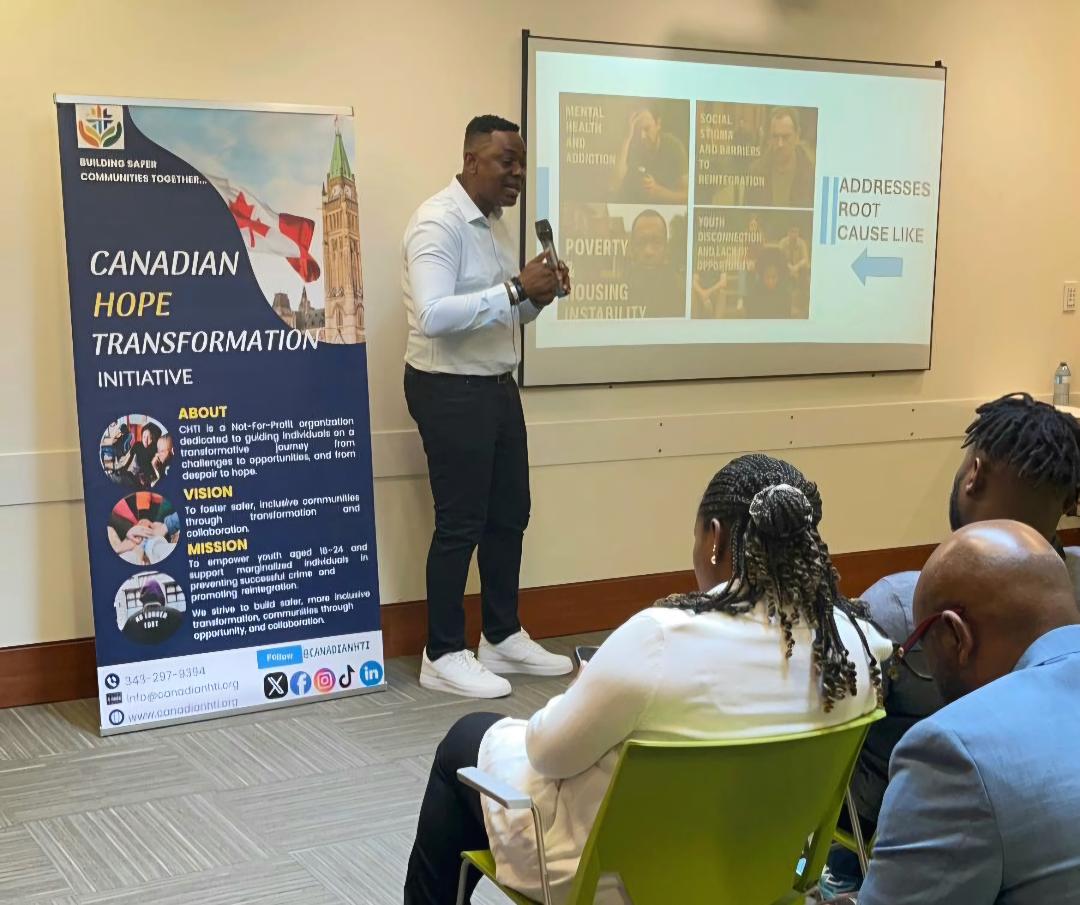CHTI Urges Community-Led Solutions to Crime, Reintegration at Ottawa Hope Conference

Local leaders, advocates, and changemakers convened at the Ottawa Public Library – Beaverbrook Branch on Saturday, May 17, for Hope Conference 1.0, an inaugural event hosted by the Canadian Hope Transformation Initiative (CHTI). Under the theme “Collaborative Pathways to Community Safety,” the conference ignited a bold, citywide call for community-driven solutions to crime prevention, systemic inequality, and reintegration of marginalized individuals.
In his keynote address, Emmanuel Tobi, Founder and COO of CHTI, challenged both the community and policymakers: > “We can’t continue treating crime prevention like it belongs to the police alone. This is a community issue—our issue. Real change starts when we build bridges, not walls.”
His speech, “Redefining Safety: Community-Led Solutions,” underscored the need for a more holistic approach to justice, one that prioritizes community involvement in both prevention and reintegration efforts.
That message of shared responsibility was amplified by Ottawa Mayor Mark Sutcliffe, who, in a goodwill letter, praised the conference as “a forum to examine crime prevention through education, collaboration, and community empowerment.”
Cathy Curry, Councilor and Deputy Mayor Ward 4 Kanata North, in a video message, echoed the importance of collective leadership, commending CHTI for “creating space where young people, service providers, and leaders can work together to build the kind of city we all deserve.”
A Conversation Rooted in Change
The panel discussion brought together a diverse lineup of voices with professional, technical, and lived experience—each contributing insight into the deeper causes of crime and possible paths toward safer communities.
Geoff Haskell, a Toronto-based criminal defense lawyer and former member of the Canadian Armed Forces, drew on both his legal and military backgrounds to examine systemic injustice. He spoke candidly about how imbalances in the justice system often punish people for a lifetime over a single mistake: “Justice isn’t just about what’s legal—it’s about what’s fair.”
Bridging the conversation between justice and opportunity, Temi Sam, a DevOps Solutions Architect at NetApp and CEO of CodeHero, highlighted the potential of technology to disrupt cycles of crime, especially among youth: > “The same tools used to build the world’s tech empires can be used to redirect our youth from cycles of crime. We must invest in their minds and give them reasons to dream.”
Adding a raw, deeply personal perspective to the dialogue was Chris Draper, a CHTI board member and speaker with lived experience. Draper shared his story of incarceration and transformation, urging more compassionate reintegration approaches: > “Everyone deserves a second chance, not a lifetime sentence outside of prison.”
Rounding out the panel was Ifeoma Okonji, a social impact strategist whose advocacy centers on equity and community development. She emphasized the need for increased grassroots involvement in shaping reintegration policies: > “True empowerment happens when communities are not just consulted but co-create the systems meant to serve them.”
Together, the panelists painted a compelling picture of what is possible when institutions, community members, and policymakers collaborate across silos. CHTI now hopes to build on the momentum of Hope Conference 1.0 by fostering more cross-sector dialogue and policy innovation around crime prevention, restorative justice, and community reintegration.
3 thoughts on “CHTI Urges Community-Led Solutions to Crime, Reintegration at Ottawa Hope Conference”
Comments are closed.



Good https://shorturl.fm/j3kEj
Good partner program https://shorturl.fm/m8ueY
Good https://shorturl.fm/j3kEj